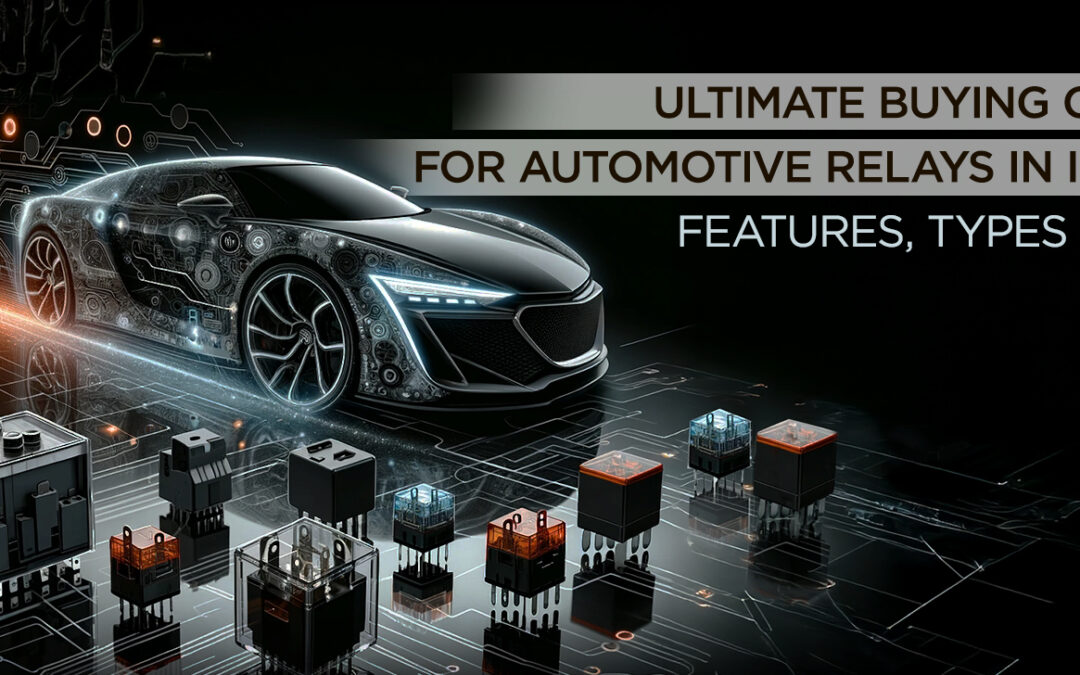Automotive relays are critical components in a vehicle’s electrical system, acting as switches that control various circuits by allowing a low-power signal to operate a higher-power circuit. This functionality is essential for components such as headlights, fuel pumps and air conditioning systems. In the Indian market, selecting the appropriate relay requires an understanding of the different types available, including electromechanical relays, which utilize mechanical contacts to open or close circuits and solid-state relays, which employ electronic components for switching without moving parts. Each type offers distinct advantages and is suited to specific applications within a vehicle’s electrical system.
When purchasing automotive relays in India, it is crucial to consider factors such as compatibility with the vehicle’s existing electrical system, the relay’s current and voltage ratings and the specific requirements of the application. Additionally, sourcing relays from reputable manufacturers ensures reliability and longevity, which is vital given the diverse environmental conditions vehicles may encounter across India. Understanding the nuances of different relay types and their respective features will enable consumers to make informed decisions, ensuring optimal performance of their vehicle’s electrical components.
What Are Automotive Relays?
Automotive relays are electromechanical switches that enable a low-power electrical circuit to control a higher-power circuit within a vehicle’s electrical system. By utilizing an electromagnet to mechanically operate a switch, these relays allow a small current to activate or deactivate larger currents, thereby managing various functions such as headlights, fuel pumps and air conditioning systems.
The fundamental design of an automotive relay includes a coil of wire wrapped around a soft iron core, an iron yoke providing a path for magnetic flux, a movable iron armature and one or more sets of contacts. When current flows through the coil, it generates a magnetic field that moves the armature, causing the contacts to open or close and thus controlling the connected circuit. This mechanism ensures that high-power components can be safely and efficiently managed by low-power control systems, enhancing the reliability and functionality of modern vehicles.
Why Are Automotive Relays Important?
1. Power Control
Relays are essential for managing high-current loads that would otherwise be too demanding for standard switches. For instance, using a basic switch to directly power headlights could result in overheating or damage to the switch over time due to the high electrical current required. By incorporating a relay, the stress is redirected, allowing the switch to handle only the control signal while the relay manages the high current. This ensures safer and more reliable operation of components like headlights, horns and cooling fans.
2. System Protection
Relays play a critical role in safeguarding a vehicle’s electrical systems. They provide an additional layer of protection against potential issues such as overheating, voltage surges and electrical failures. By acting as a buffer, they help prevent damage to sensitive components and wiring, ensuring the longevity of the vehicle’s electrical infrastructure. This added safety is particularly important in modern vehicles with increasingly complex electrical systems.
3. Modular Design
Automotive relays contribute to the modular and efficient design of modern vehicles. By centralizing control and reducing the need for extensive wiring, they help streamline the vehicle’s architecture. This not only minimizes wiring complexities but also makes it easier for mechanics to diagnose and fix issues. The modular approach supported by relays ensures that repairs are more straightforward, saving time and reducing costs for vehicle owners.
4. Durability
Built to withstand the harsh conditions of automotive environments, relays are designed for durability. They can endure fluctuating temperatures, exposure to moisture and the constant vibrations that come with everyday driving. This rugged construction ensures that relays remain reliable over time, even under demanding conditions, making them a critical component for maintaining the overall reliability of a vehicle’s electrical system.
Understanding their importance lays the groundwork for selecting the right relay for your specific application. Next, let’s explore the different types available.
Types of Automotive Relays
Automotive relays come in various types, each designed with unique properties tailored to specific applications in modern vehicles. Relays are an essential component in automotive systems, enabling the control of electrical circuits efficiently and safely. Let’s take a closer look at the different types of automotive relays and their applications:
1. General-Purpose Relays
These relays are the workhorses of the automotive world, used in everyday systems like lighting, horns and accessories. They are versatile, cost-effective and suitable for a wide range of standard electrical functions. From switching on headlights to controlling power windows, general-purpose relays are reliable and widely used across vehicles.
2. High-Current Relays
High-current relays are designed to handle circuits that draw significant amounts of power. These heavy-duty relays are commonly used in systems like winches, high-powered auxiliary lighting and electric cooling fans. Their robust design ensures they can withstand large currents without overheating, making them ideal for demanding applications in trucks, SUVs and off-road vehicles.
3. Solid-State Relays
Unlike mechanical relays with moving parts, solid-state relays use semiconductors to perform their switching functions. This design eliminates wear and tear, making them highly durable and reliable over time. Known for their longevity, quicker response times and silent operation, solid-state relays are often used in advanced automotive systems like electric vehicles, where efficiency and precision are key.
4. Miniature Relays
These compact relays pack power into a small form factor, making them perfect for tight spaces. They are widely used in motorcycles, scooters and compact cars where space is limited but reliable functionality is still essential. Despite their small size, miniature relays can handle considerable loads and are crucial for systems like fuel pumps, power locks and small lighting systems.
5. Time Delay Relays
Time delay relays are designed to introduce a delay before activating or deactivating a circuit. These are commonly used in features like windshield wiper delay controls, where intermittent wiping is needed, or in interior lighting systems that gradually dim after the doors are closed. Their ability to add precise timing control makes them an essential component in enhancing user convenience and functionality.
6. Thermal Relays
Thermal relays are equipped with temperature-sensitive components that automatically cut off the circuit when overheating is detected. This makes them an important safety feature in systems like electric heaters, defrosters, or circuits prone to excessive current. By providing thermal protection, these relays prevent damage to the electrical system and reduce the risk of fire.
Understanding the various types of relays and their distinct features can help you select the right one for your specific automotive application. Whether you need a heavy-duty relay for a high-power system or a compact relay for a smaller vehicle, knowing what to look for ensures safer and more efficient performance.
Key Features to Consider for High-Quality Automotive Relays
When it comes to automotive relays, choosing the right one is critical to ensure optimal performance, safety and longevity of your vehicle’s electrical system. Not all relays are created equal and understanding the features that distinguish a high-quality relay can save you from potential failures and costly repairs down the line. Below, we’ll explore each key feature in greater detail to help you make an informed decision.
1. Voltage and Ampere Ratings
Voltage and current ratings are among the most fundamental factors to consider when selecting an automotive relay. Every vehicle’s electrical system is designed to operate within specific voltage and amperage parameters. For instance, most passenger vehicles use a standard 12V system, whereas larger commercial vehicles might require 24V relays. A relay that cannot handle the required voltage or current load can overheat, cause wiring issues, or even lead to complete electrical failure. To avoid such risks, always confirm the relay’s ratings align perfectly with your vehicle’s requirements. High-quality relays often come with precise, clearly labeled ratings to eliminate guesswork.
2. Durability
Durability is a hallmark of a quality relay, especially in a country like India, where vehicles are exposed to diverse climatic conditions and challenging road environments. A reliable relay should be engineered to withstand high temperatures, vibrations and exposure to moisture. Poor-quality relays may fail under such conditions, causing operational disruptions. Premium relays are made from heat-resistant materials, feature vibration-proof designs and often include moisture-sealed enclosures for added durability. If you frequently drive in areas with extreme heat, heavy rains, or rough terrain, investing in a durable relay is non-negotiable.
3. Compact Size
Space is often at a premium in a vehicle’s electrical system. High-quality automotive relays are designed to be compact, ensuring they can fit seamlessly into tight spaces without compromising functionality. A compact size is particularly important for modern vehicles with complex electrical setups where every inch of space matters. However, compactness should not come at the cost of performance. Quality relays manage to achieve space efficiency while still delivering robust capabilities. Be wary of overly small, low-cost relays that may sacrifice key features to achieve a smaller footprint.
4. Mounting Options
The mounting mechanism of a relay can significantly impact its usability and longevity. Depending on your vehicle’s requirements, you might need a plug-in relay, which is easy to install and replace, or a screw-mounted relay, which provides a more secure fit for heavy-duty applications. High-quality relays offer sturdy and reliable mounting options to ensure they remain firmly in place, even in high-vibration environments. Poorly mounted relays can loosen over time, leading to erratic performance. Always consider where and how the relay will be installed before making your purchase.
5. Connection Type
The connection type of a relay determines how it integrates with your vehicle’s wiring system. The most common configurations are 4-pin and 5-pin relays, each serving different purposes. High-quality relays come with well-constructed connection pins or terminals that ensure a snug, secure fit and minimize the risk of loose or faulty connections. Additionally, premium relays often feature corrosion-resistant terminals, enhancing their longevity and performance. Before choosing a relay, verify that its connection type matches your vehicle’s wiring setup to avoid compatibility issues.
6. Insulation and Protection
Insulation and protective features are critical for safeguarding a relay’s internal components from external threats like dirt, dust, moisture and corrosion. High-quality relays are built with robust insulation materials and often include protective covers or sealed designs to shield sensitive components. This is especially important for vehicles operating in harsh conditions, such as dusty roads, humid environments, or areas with heavy rain. A well-protected relay is less likely to fail prematurely, providing you with peace of mind and long-term reliability.
The Importance of Quality
Quality is the common thread that ties all these features together. High-quality relays not only perform better but also last longer, saving you from the hassle and expense of frequent replacements. They are often manufactured by trusted brands that adhere to stringent quality standards, ensuring reliability even under demanding conditions. When evaluating relays, look for certifications or compliance with industry standards, as these are indicators of a relay’s quality.
Where to Buy the Right Automotive Relay in India
Once you’ve identified the features you need, it’s essential to choose a reputable supplier to ensure you’re getting a genuine, high-quality product. Avoid opting for cheap, low-quality relays that may end up costing you more in the long run due to frequent failures or inadequate performance. Reputable manufacturers or authorized dealers are your best bet for sourcing durable and reliable relays built to perform under real-world conditions.
By focusing on these key features and prioritizing quality, you can ensure that the automotive relay you choose will support your vehicle’s electrical system effectively and reliably, no matter the challenges.
Where to Buy Automotive Relays in India?
India is home to both physical retail stores and online platforms offering automotive relays. Here are some reliable options:
1. Automotive Part Retailers
For quick and convenient access to relays, visit auto parts shops in your area. These stores often stock a wide variety of relays and you can chat directly with experts who can guide you in selecting the right relay based on your vehicle’s requirements. Whether you’re replacing a damaged relay or upgrading, these shops are a reliable option for tailored advice and immediate purchases.
2. OEM Dealers
Original Equipment Manufacturers (OEMs) produce high-quality relays specifically designed for certain brands and models of vehicles. Purchasing from an OEM dealer ensures you get a relay that meets the exact specifications of your vehicle, delivering optimal performance and reliability. This is a great option if authenticity and compatibility are your top priorities.
3. Online Marketplaces
Websites like Amazon, Flipkart and industry-specific platforms such as Indiamart offer an extensive range of automotive relays. These platforms often provide detailed product descriptions, price comparisons and customer reviews to help you make an informed choice. Online shopping is especially convenient if you’re looking for a variety of options or need to order from the comfort of your home.
4. Authorized Distributors
Many well-known relay brands, such as Leone Relay, work with authorized distributors across the country to provide customers with genuine, high-performance products. Buying from these distributors ensures the quality and durability of the relays and they often offer additional support or warranties. This is an excellent option if you’re looking for trusted products backed by the manufacturer.
Tips for Choosing the Right Automotive Relay
Selecting the right relay doesn’t have to be overwhelming—keep these tips in mind:
- Understand the Application: Clearly identify what the relay will be used for. Is it to control your vehicle’s lights, power the horn, or manage high-current equipment like fuel pumps or cooling fans? A clear understanding of the application helps you select the right type of relay for your needs.
- Verify Compatibility: Double-check that the relay is compatible with your vehicle’s power ratings, such as voltage and amperage and matches the wiring specifications. Using an incompatible relay can lead to electrical malfunctions or even damage to your vehicle’s system.
- Check Reviews: If purchasing online, take the time to read customer reviews and ratings. These can provide insights into the relay’s reliability, functionality and durability based on real-world usage by other buyers.
- Opt for Brands: It’s always a good idea to go for trusted brands like Leone Relay. Established brands are known for their quality, performance and durability, reducing the chances of premature failures. A reliable brand can save you time and money in the long run.
- Stock Extras: Relays are inexpensive yet essential components in many automotive systems. It’s wise to buy a few extras to keep in your toolkit or glove box. This way, if one fails unexpectedly, you have a backup ready to go without any delay.
Why you should look for Automotive Relays from Leone Relay
Leone Relays, established in 2000-01 under Glomore Electro-Tech, has emerged as a leading manufacturer of high-quality electromechanical and solid-state relays, catering to diverse applications across various industries.
Leone Relays automotive relays are designed for durability and high performance, making them a trusted choice for customers worldwide.
With a commitment to innovation and reliability, Leone Relays ensures that their products meet international electric standards, providing customers with dependable solutions for their automotive relay needs.
Features of Leone Relays:
- High current capacities
- Compact, durable designs
- Rigorously tested for Indian road conditions
- Available in multiple configurations and mounting styles
Whether you’re upgrading your headlights or wiring a custom accessory, investing in Leone Relay guarantees peace of mind and flawless function.
Drive Smarter, Choose Better
Automotive relays are small but mighty components critical to your vehicle’s performance and safety. With the right knowledge of types, features and tips shared in this guide, you’re ready to make an informed purchase.
For unparalleled quality, consider Leone Relays—and remember, a well-chosen relay can keep your vehicle running smoothly and efficiently.


